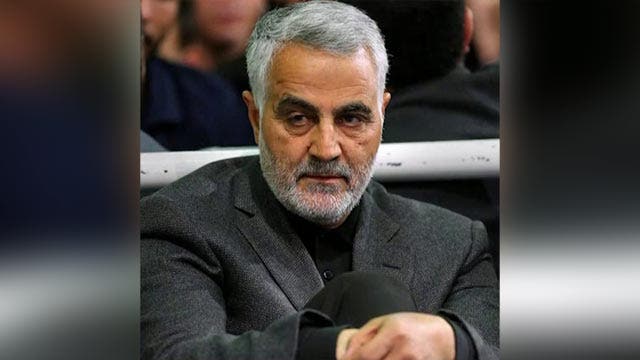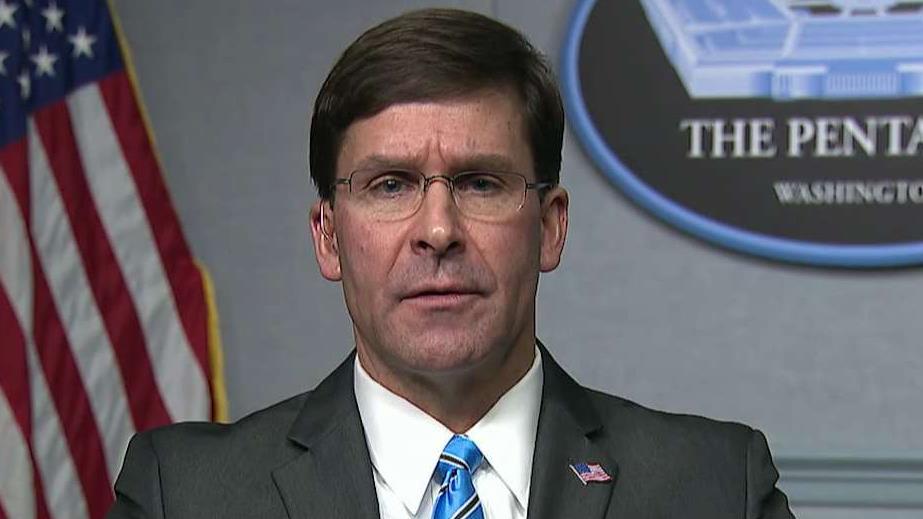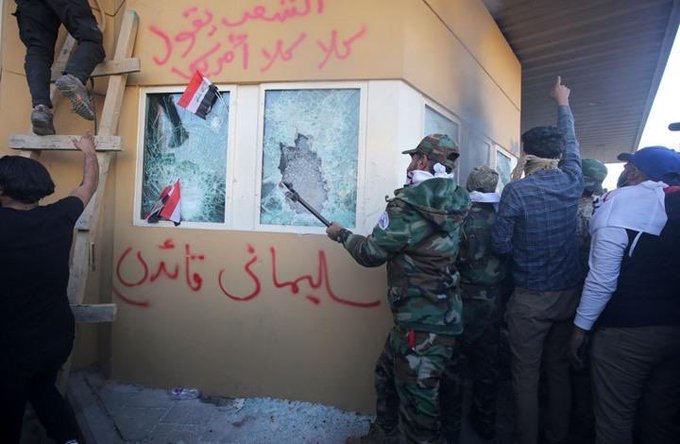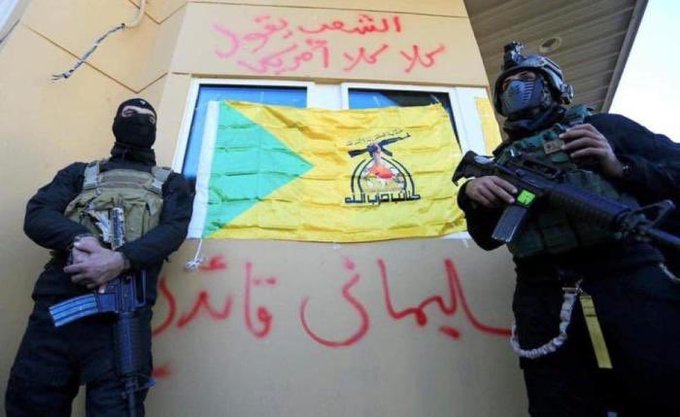At least three rockets were fired at Baghdad International Airport Friday killing at least seven people, including Iranian Gen. Qassim Soleimani, the head of the Islamic Revolutionary Guard Corps' elite Quds Force, according to multiple reports early Friday.
Soleimani is the military mastermind whom Secretary of State Mike Pompeo had deemed equally as dangerous as Islamic State leader Abu Bakr al-Baghdadi, who was killed in a strike by U.S.-led forces in October.
Soleimani was the long-running leader of the elite intelligence wing called Quds Force – which itself has been a designated terror group since 2007, and is estimated to be 20,000 strong. Considered one of the most powerful men in Iran, he was routinely referred to as the “shadow commander” or “spymaster.”
"Soleimani is our leader" had been photographed spray-painted on windows by Iran-backed militiamen at the U.S. Embassy in Baghdad.
The strike also killed Abu Mahdi al-Muhandis, the deputy commander of Iran-backed militias known as the Popular Mobilization Forces, three Iraqi officials told The Associated Press. Iraqi TV reported the deaths as well.

Local reporters had suggested that pro-Iran military leaders may have been targeted, but officials have not yet confirmed all of the dead and who may have been behind the attack. An official with an Iran-backed paramilitary group known as the Popular Mobilization Forces told The Associated Press one of the victims was its airport protocol officer, identifying him as Mohammed Reda.
Iraq’s Security Media Cell, which released information regarding Iraqi security, said the three Katyusha rockets landed near the cargo hall.
Iraqi security also said two cars were on fire.
The nighttime attack occurred amid tensions with the U.S. after an Iran-backed militia attacked the U.S. Embassy in Baghdad, which was targeted Tuesday by angry mobs who were protesting recent U.S. airstrikes.
The two-day siege outside of the U.S. Embassy in Baghdad came to an end Wednesday afternoon after dozens of pro-Iran militiamen and their supporters withdrew from the compound.
The crisis started early Tuesday, when, in an orchestrated assault, hundreds of protesters stormed the embassy compound, one of the most heavily fortified U.S. diplomatic missions in the world.
President Trump, who on Tuesday night vowed that the situation "will not be a Benghazi" -- a pointed reference to the deadly 2012 attack on the U.S. consulate in Libya on the Obama administration's watch, ordered deployment of about 750 U.S. soldiers to the Middle East.
The embassy attack, one of the worst in recent memory, followed deadly U.S. airstrikes on Sunday that killed 25 fighters of the Iran-backed group, the Kataeb Hezbollah. The U.S. military said the airstrikes were retaliation for last week's killing of an American contractor in a rocket attack on an Iraqi military base, which the U.S. blamed on the militia.

Secretary of Defense Mark Esper reacted on Thursday to the U.S. Embassy attack in Iraq earlier this week, saying that it's time for Iran to start "acting like a normal country.”
“We are there in Iraq working with our Iraqi partners to ensure the enduring defeat of ISIS,” Esper said on “America’s Newsroom” on Thursday.
https://www.foxnews.com/world/rockets-baghdad-airport-injuries-reported
Soleimani is the military mastermind whom Secretary of State Mike Pompeo had deemed equally as dangerous as Islamic State leader Abu Bakr al-Baghdadi, who was killed in a strike by U.S.-led forces in October.
Soleimani was the long-running leader of the elite intelligence wing called Quds Force – which itself has been a designated terror group since 2007, and is estimated to be 20,000 strong. Considered one of the most powerful men in Iran, he was routinely referred to as the “shadow commander” or “spymaster.”
"Soleimani is our leader" had been photographed spray-painted on windows by Iran-backed militiamen at the U.S. Embassy in Baghdad.
The strike also killed Abu Mahdi al-Muhandis, the deputy commander of Iran-backed militias known as the Popular Mobilization Forces, three Iraqi officials told The Associated Press. Iraqi TV reported the deaths as well.

Local reporters had suggested that pro-Iran military leaders may have been targeted, but officials have not yet confirmed all of the dead and who may have been behind the attack. An official with an Iran-backed paramilitary group known as the Popular Mobilization Forces told The Associated Press one of the victims was its airport protocol officer, identifying him as Mohammed Reda.
Iraq’s Security Media Cell, which released information regarding Iraqi security, said the three Katyusha rockets landed near the cargo hall.
Iraqi security also said two cars were on fire.
Rockets Strike #Iraq's #BaghdadAirport, #USMilitary Choppers Spotted in Airspace. Three rockets landed on the edge of #Baghdad International Airport , causing explosions but no deaths or injuries, according to local reporters.#IraqiProtests
166 people are talking about this
The nighttime attack occurred amid tensions with the U.S. after an Iran-backed militia attacked the U.S. Embassy in Baghdad, which was targeted Tuesday by angry mobs who were protesting recent U.S. airstrikes.
The two-day siege outside of the U.S. Embassy in Baghdad came to an end Wednesday afternoon after dozens of pro-Iran militiamen and their supporters withdrew from the compound.
The crisis started early Tuesday, when, in an orchestrated assault, hundreds of protesters stormed the embassy compound, one of the most heavily fortified U.S. diplomatic missions in the world.
President Trump, who on Tuesday night vowed that the situation "will not be a Benghazi" -- a pointed reference to the deadly 2012 attack on the U.S. consulate in Libya on the Obama administration's watch, ordered deployment of about 750 U.S. soldiers to the Middle East.
The embassy attack, one of the worst in recent memory, followed deadly U.S. airstrikes on Sunday that killed 25 fighters of the Iran-backed group, the Kataeb Hezbollah. The U.S. military said the airstrikes were retaliation for last week's killing of an American contractor in a rocket attack on an Iraqi military base, which the U.S. blamed on the militia.

Secretary of Defense Mark Esper reacted on Thursday to the U.S. Embassy attack in Iraq earlier this week, saying that it's time for Iran to start "acting like a normal country.”
“We are there in Iraq working with our Iraqi partners to ensure the enduring defeat of ISIS,” Esper said on “America’s Newsroom” on Thursday.
https://www.foxnews.com/world/rockets-baghdad-airport-injuries-reported







No comments:
Post a Comment